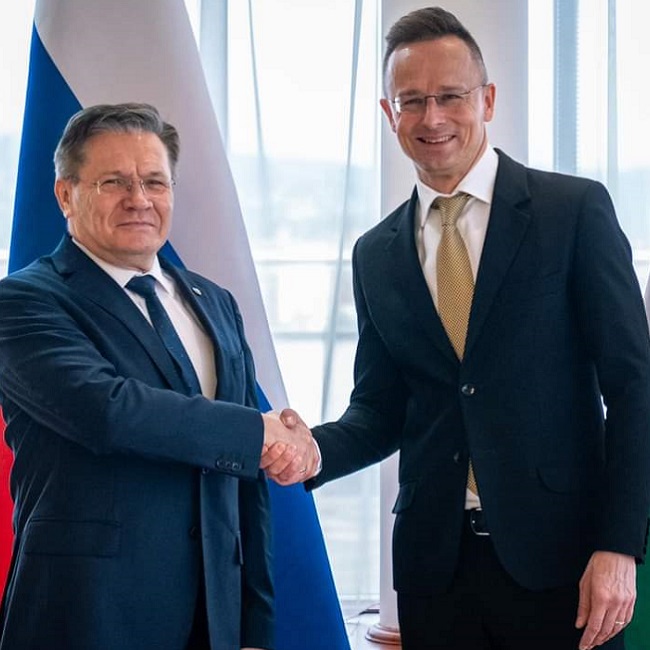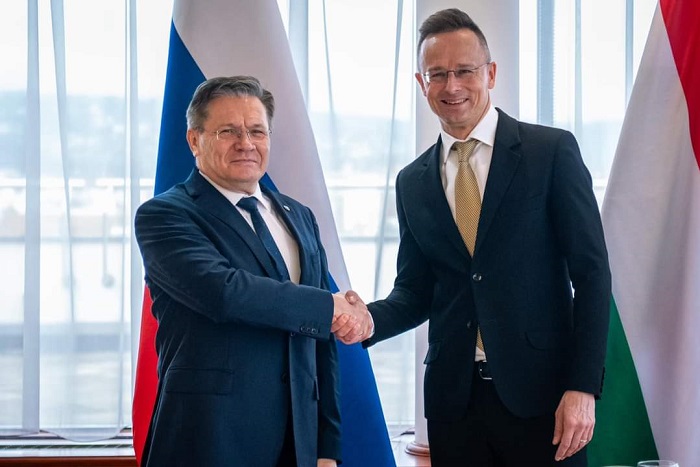
The parties discussed Implementation of the Paks-2 NPP Project.
On March 12, 2024, Alexey Likhachev, Director General of ROSATOM, met in Budapest with Hungary’s Minister of Foreign Affairs and Trade of Hungary Peter Szijjártó.

After the talks, Alexey Likhachev and Peter Szijjártó noted that work on the construction of new power units at the Paks NPP is proceeding at a high pace. Last year, ahead of schedule, excavation was carried out to the depth of 5 meters, the level of groundwater. The construction of impervious curtain – a special underground concrete wall around the excavation 2,700 meters long – was completed, which will protect the working excavation from groundwater infiltration and ensure safe operation of active power units during the construction of new ones. At present, the soil is being actively strengthened Now the ground is being actively consolidated, and, in the summer of 2024, it is planned to start excavation of the foundation pit up to the design marks – to the depth of 30 metres. After that, work will begin on the preparation of reinforced concrete for the future foundation slab.
‘The momentum we have gained allows us to expect that all preparatory work at the site will be completed by the end of this year, which will ensure that we can proceed directly to the pouring of the first concrete. Therefore, I believe that this year will be a particularly remarkable one for the entire project. It is also important that we have made considerable progress in optimizing and updating the EPC contract, working together with the Hungarian side,’ emphasized Alexey Likhachev.
The Hungarian industry is showing great interest in the project. As of now, more than 100 subcontractor companies from Hungary as well as other European countries are already involved in it. In February, the general contractor of the project, ASE JSC, held a workshop for potential suppliers. It was attended by representatives of almost 190 companies from different countries.
‘On the site of Paks II NPP work is ongoing, there are no obstacles to pouring the first concrete by the end of this year, as there are no obstacles to connecting two new power units to the Hungarian power grid at the beginning of the next decade. Russia has completed production of the melt trap, so it will be delivered to Hungary in the near future. This will be a powerful operation, because this heavy equipment weighs more than 700 tons. We are proud of the fact that a truly large international project is being implemented in Paks, because in addition to the Russian general contractor, there are also German, French, Austrian, Swedish and American companies in the chain of subcontractors,’ said Peter Szijjarto.
In April, the production of the reactor pressure vessel for the first power unit of the Paks-2 NPP will start in Russia. In the second half of the year, the melt trap will be delivered to Hungary as part of the equipment to limit the consequences of out-of-design basis accidents. This will be the first long production cycle equipment delivered to the construction site.
The Paks-2 project is the first project in the European Union to receive a license for the construction of nuclear power units based on a reference Russian design. Rosatom is the world leader in the construction of new units and is simultaneously constructing 22 power units in 7 countries. Rosatom’s order portfolio includes two of the largest nuclear construction projects in the world, in Türkiye and Egypt, in both of which 4 power units are being built at the same time. Construction projects in India, China and Bangladesh are being actively implemented. After the commissioning of the Belarusian nuclear power plant, the authorities of the republic started weighing the feasibility of constructing another power unit, while Türkiye is considering a possible building of a second nuclear power plant at Sinop.
‘ROSATOM is also developing small-scale nuclear generation and creating fourth generation nuclear power technologies, which will significantly reduce radioactive waste by reprocessing spent nuclear fuel for reuse. Working now on technologies of the future, we plan to share our best practices with partners after the creation of reference samples, and Hungary is certainly among such partners,’ pointed out the head of ROSATOM.
Reference:
The Paks-2 NPP project is being implemented on the basis of the Russian-Hungarian intergovernmental agreement of January 14, 2014, and three basic contracts for the construction of a new plant. The main license for the construction of Paks-2 NPP was issued by the Hungarian regulating authority in August 2022. Paks-2 NPP with two Gen 3+ VVER-1200 units will be constructed on a turnkey basis. The Paks-2 NPP is the first Russian project on the territory of the European Union. Obtaining a construction license confirmed the project’s compliance with Hungarian and European safety standards. There are already 4 VVER-1200 units successfully operating in Russia and two similar units outside Russia, at the Belarusian NPP. In total, ROSATOM’s foreign order portfolio includes 33 power units in 10 countries.